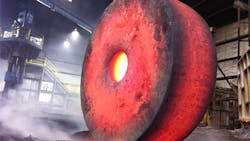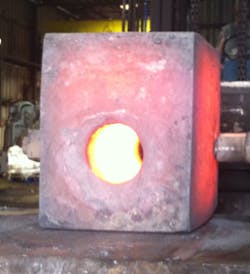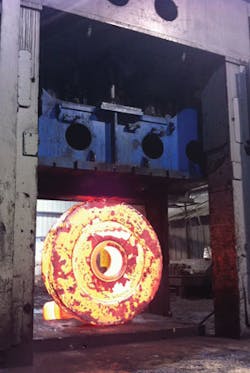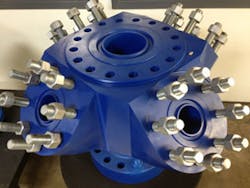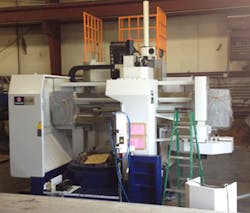If any industrial sector has navigated the global economy over the past decade it is oil and gas, and those firms doing the exploring, refining, transporting, and storing energy products have done more than stick around: they have thrived. In that business, the only way to improve is to grow, to expand, and particularly to keep looking for new sources.
The energy sector grows because the world always needs more light and heat and power, and there are rewards for those who take risks to ensure we have those things. But it takes more than determination to get oil and gas out of the earth, and even the risk-takers need help to complete their missions. They are growing, too.
Among those growing enterprises Forged Components Inc., but its growth is based on not simply on supplying engineered parts to the booming oil-and-gas exploration industry. There is skill and determination involved, and a record of forging expertise behind FCI’s recent success. Most important, there is a willingness to address the specific needs of different types of energy-sector customers.
The Houston-area company has been in business for just 17 years, but is well known for its wide selection of forged products, including: ASME and API pressure-containing components of all sizes; wellhead products (including frac bodies, casing heads and valves); power generation products, including tees, wyes, and laterals; and subsea products, including riser flanges, misalignment flanges, studded outlets, and swivel flange assemblies.
Forged Components Inc. was established by Karl Lyons in order to supply pressure vessel and oil-and-gas customers, but his forging career began more than 30 years earlier, with the Lenape Forge and its partner Lukens Steel, which supplied modified steel plate and mating modules for high-pressure vessel fabricators. That project was defined by emerging standards for the products supplied to the nuclear power industry, Sec. III Nuclear and ASME Section 8 Division 2 Vessel Pressure Containment Parts.
In 1976, Lyons and a partner started a venture in Texas to supply pressure-vessel containment products to a growing number of customers in the Southwest, and in 1987 he left that company and started a new business to import a similar range of flanges and pressure-vessel containment products for oil-and-gas customers. In 1992, he expanded that range of products to include ball valves, maintaining the business until establishing Forged Components Inc. in July 1997. Now, it’s a $60 million/year enterprise, with more than 400 employees and contractors at five plants, and more than 500 active customers.
Fully Integrated
The main location in Humble, TX, including FCI’s headquarters, is home to a 1,750-ton hydraulic press, supported by forging and normalizing furnaces, and a machine shop for roughing and finishing.
About a 90-minutes-drive northwest in Navasota, TX, FCI operates an ISO 9000-2008-certified plant with a two more presses — 3,000- and 2,000-tons — and a 300-ton ring-rolling machine.
Closer to the headquarters plant, in Porter, TX, FCI has a forging and machining plant for smaller products, anchored by a 350-ton hydraulic press.
The group has another operation a bit northwest of Porter, FCI-A&T Machine Shop, which handles roughing and finishing of products for heat-treating. The plant is situated to serve each of the other locations.
The latest entry to the portfolio is FCI Subsea, in northwest Houston. In 2012 Forged Components Inc. purchased Atex Manufacturing, a custom machining operation for subsea fittings and flanges in Conroe, TX. Atex was merged into the FCI’s CNC machining operation in Houston, and renamed FCI Subsea Inc. It, too, is ISO 9000-2008-certified, and PED certified too.
This addition is an example of FCI’s growth strategy: the new division allows the company to diversify its capabilities, now covering “upstream, midstream, and downstream” engineered products, according to a source there, and it expands the range of services that FCI is able to perform. In addition, it has increased the variety and quality of products it offers its customers.
More than that, adding FCI Subsea has expanded the range of customers within the broader energy industry the organization is able to supply.
One further point: FCI recognized it was important to show its current customers that it was expanding the business to serve them better — and to let the Atex customers know that they would be gaining the advantages of service by a larger company that could provide one-stop service. Being a vertically integrated forging organization that can handle a customer’s order, from raw material requirements through to machining, heat-treating, testing, and finishing to specifications is an important part of the FCI identity.
Beyond the forging and machining equipment, FCI has NDE testing, BHN hardness testing, liquid penetrant testing, and ultrasonic testing, all in-house. Quality control engineers and a Level III technician are on staff at each location to oversee inspection, and write procedures, as necessary.
Forged Components Inc. is equipped with a variety of tools to support multiple forging techniques, too, accelerating its response time and ability to process numerous forging configurations. These tooling styles include variable modular pot dies, slip-pot tooling, stackable tooling rings, and mandrel rolling pins, cogging dies, extrusion V-dies, closed die sets and common open-die tools.
All the major tooling components are maintained for immediate use, and the Navasota plant has a large inventory of tooling blanks and materials to manufacture any specialty tooling needs quickly.
FCI maintains a “modular” concept for tooling for pressure products, so customers are not required to invest in specialized tooling for their orders. This means, for example, that FCI is able to forge a one-piece part to replace a three-piece welded construction, saving time and cost for welding and inspecting new tools.
The scope of service actually precedes tooling and production. Design engineers are on staff to prepare orders for production. Product modeling is done in SolidWorks or Mastercam (machining), though the engineers are able to use almost any design program.
Once a model is complete, they will use EdgeCam to determine cutting patterns, and to back-plot data for verification. The CNC programs are transferred to turning machines or lathes for the machining and finishing processes.
Products and Projects
All these assets and capabilities (and high quality standards) have helped FCI establish a reputation among vessel engineering and fabricators as “nozzle experts”; exceptional customer service helps maintain that status. And, the ability to service all the major market segments of the oil-and-gas — pressure vessel, wellhead, power products, and subsea parts — helps to widen its notoriety.
Among the notable projects FCI completed, it manufactured a 24-in., 300# Q-lip nozzle, 18-in. long, and with an addition internal projection of 6 in. Another extraordinary product was a 20-in., customized Hillside nozzle, with a 69.94-in. cylindrical radius.
Following the BP Deepwater Horizon well explosion, FCI was called to build a customized, 12,000-lb. part for National Oilwell Varco, as part of the repair effort. Crews worked around the clock to forge, rough machine, heat treat, and finish the part within eight days of the purchase order.
Most recently, FCI completed a rough machined diverter forging weighing over 36,000 lb.; another similar forging weighing 46,500 lb. followed that project.
The energy that FCI devotes to its production efforts is also focused on its development plans. Currently, the forging plant in Humble is being extended by 12,000-sq.ft. to improve its manufacturing and shipping operations.
FCI Subsea is working now to gain certification for Inconel inlay and overlay process, for one of its customers. And, future plans include expanding the heat-treating capabilities (to save the the time and cost of transferring products between sites); and establishing in-house testing capability, in order to save processing costs.
More than these plans, Forged Components Inc. remains alert to other opportunities that may improve its production capabilities or enhance its service, including lowering costs. Being a one-stop source for forged and machine products is valuable to customers, but maintaining that ability is the way that FCI approaches its business.
About the Author
Robert Brooks
Editor/Content Director - Endeavor Business Media
Robert Brooks has been a business-to-business reporter, writer, editor, and columnist for more than 20 years, specializing in the primary metal and basic manufacturing industries. His work has covered a wide range of topics including process technology, resource development, material selection, product design, workforce development, and industrial market strategies, among others.
Currently, he specializes in subjects related to metal component and product design, development, and manufacturing—including castings, forgings, machined parts, and fabrications.
Brooks is a graduate of Kenyon College (B.A. English, Political Science) and Emory University (M.A. English.)
